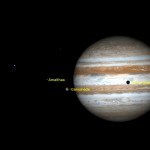On This Day in Space! July 6, 1938: Discovery of Jupiter’s moon Lysithea, ,

On July 6, 1938, an American astronomer named Seth Barnes Nicholson discovered Jupiter’s moon Lysithea.
Nicholson spotted Lysithea from Mount Wilson Observatory in California, where he had previously discovered three more Jovian moons. This was the tenth moon astronomers had found at Jupiter. As of June 2017, 69 moons have been found orbiting Jupiter.
Lysithea only measures about 11 miles in diameter and is part of Jupiter’s Himalia group, which contains five irregular moons that follow similar orbits and are thought to have a common origin.
It was named after the mythological character Lysithea, daughter of the god Oceanus and one of the many lovers of the almighty Zeus.
Catch up on our entire “On This Day In Space” series on YouTube with this playlist.
[image error]
History of NASA: $22.99 at Magazines Direct
Discover the story of how and why NASA was created, its greatest triumphs, darkest days, and of the times it exceeded all possible hopes. A tale of adventure, heroism and resourcefulness, learn of the space agency’s greatest achievements and how — over six decades — the organization has consistently and tirelessly devoted itself to its founding principle: that “activities in space should be devoted to peaceful purposes for the benefit of all humankind”. View Deal
Still not enough space? Don’t forget to check out our Space Image of the Day, and on the weekends our Best Space Photos and Top Space News Stories of the week.
Email Hanneke Weitering at hweitering@space.com or follow her @hannekescience. Follow us @Spacedotcom and on Facebook.
Join our Space Forums to keep talking space on the latest missions, night sky and more! And if you have a news tip, correction or comment, let us know at: community@space.com.
The post On This Day in Space! July 6, 1938: Discovery of Jupiter’s moon Lysithea, , appeared first on NEWDAWN Blog.



